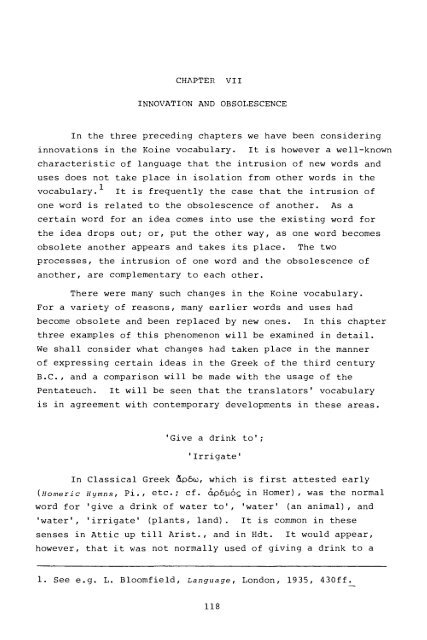A Lexical Study of the Septuagint Version of the Pentateuch
A Lexical Study of the Septuagint Version of the Pentateuch
A Lexical Study of the Septuagint Version of the Pentateuch
Create successful ePaper yourself
Turn your PDF publications into a flip-book with our unique Google optimized e-Paper software.
CHAPTER VII<br />
INNOVATION AND OBSOLESCENCE<br />
In <strong>the</strong> three preceding chapters we have been considering<br />
innovations in <strong>the</strong> Koine vocabulary. It is however a well-known<br />
characteristic <strong>of</strong> language that <strong>the</strong> intrusion <strong>of</strong> new words and<br />
uses does not take place in isolation from o<strong>the</strong>r words in <strong>the</strong><br />
vocabulary.''" It is frequently <strong>the</strong> case that <strong>the</strong> intrusion <strong>of</strong><br />
one word is related to <strong>the</strong> obsolescence <strong>of</strong> ano<strong>the</strong>r. As a<br />
certain word for an idea comes into use <strong>the</strong> existing word for<br />
<strong>the</strong> idea drops out; or, put <strong>the</strong> o<strong>the</strong>r way, as one word becomes<br />
obsolete ano<strong>the</strong>r appears and takes its place. The two<br />
processes, <strong>the</strong> intrusion <strong>of</strong> one word and <strong>the</strong> obsolescence <strong>of</strong><br />
ano<strong>the</strong>r, are complementary to each o<strong>the</strong>r.<br />
There were many such changes in <strong>the</strong> Koine vocabulary.<br />
For a variety <strong>of</strong> reasons, many earlier words and uses had<br />
become obsolete and been replaced by new ones. In this chapter<br />
three examples <strong>of</strong> this phenomenon will be examined in detail.<br />
We shall consider what changes had taken place in <strong>the</strong> manner<br />
<strong>of</strong> expressing certain ideas in <strong>the</strong> Greek <strong>of</strong> <strong>the</strong> third century<br />
B.C., and a comparison will be made with <strong>the</strong> usage <strong>of</strong> <strong>the</strong><br />
<strong>Pentateuch</strong>. It will be seen that <strong>the</strong> translators' vocabulary<br />
is in agreement with contemporary developments in <strong>the</strong>se areas.<br />
'Give a drink to';<br />
'Irrigate'<br />
In Classical Greek αρδω, which is first attested early<br />
(Homeric Hymns, Pi., etc.; cf. άρδμός in Homer), was <strong>the</strong> normal<br />
word for 'give a drink <strong>of</strong> water to', 'water' (an animal), and<br />
'water', 'irrigate' (plants, land). It is common in <strong>the</strong>se<br />
senses in Attic up till Arist., and in Hdt. It would appear,<br />
however, that it was not normally used <strong>of</strong> giving a drink to a<br />
1. See e.g. L. Bloomfield, Language, London, 1935, 430ff.

















